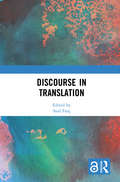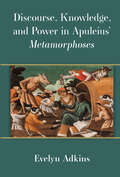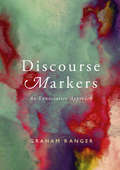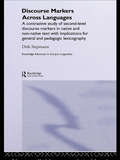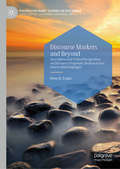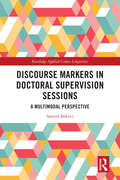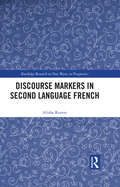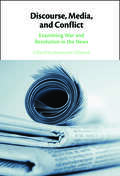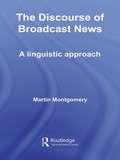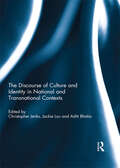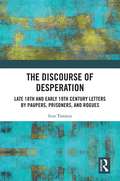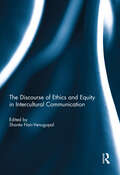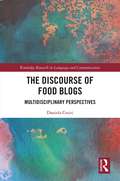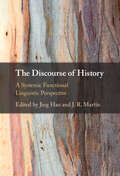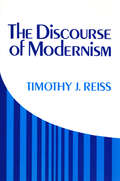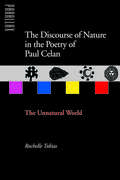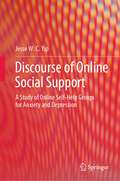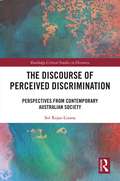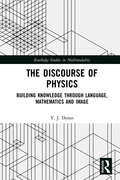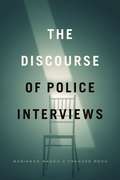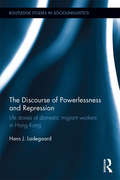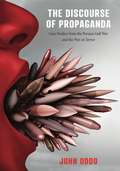- Table View
- List View
Discourse in Translation (Routledge Studies In Language And Identity Ser.)
by Said FaiqThis book explores the discourse in and of translation within and across cultures and languages. From the macro aspects of translation as an inter- cultural project to actual analysis of textual ingredients that contribute to translation and interpreting as discourse, the ten chapters represent different explorations of ‘global’ theories of discourse and translation. Offering interrogations of theories and practices within different sociocultural environments and traditions (Eastern and Western), Discourse in Translation considers a plethora of domains, including historiography, ethics, technical and legal discourse, subtitling, and the politics of media translation as representation. This is key reading for all those working on translation and discourse within translation studies and linguistics.
Discourse, Knowledge, and Power in Apuleius’ Metamorphoses
by Evelyn AdkinsIn ancient Rome, where literacy was limited and speech was the main medium used to communicate status and identity face-to-face in daily life, an education in rhetoric was a valuable form of cultural capital and a key signifier of elite male identity. To lose the ability to speak would have caused one to be viewed as no longer elite, no longer a man, and perhaps even no longer human. We see such a fantasy horror story played out in the Metamorphoses or The Golden Ass, written by Roman North African author, orator, and philosopher Apuleius of Madauros—the only novel in Latin to survive in its entirety from antiquity. In the novel’s first-person narrative as well as its famous inset tales such as the Tale of Cupid and Psyche, the Metamorphoses is invested in questions of power and powerlessness, truth and knowledge, and communication and interpretation within the pluralistic but hierarchical world of the High Roman Empire (ca. 100–200 CE). Discourse, Knowledge, and Power presents a new approach to the Metamorphoses: it is the first in-depth investigation of the use of speech and discourse as tools of characterization in Apuleius’ novel. It argues that discourse, broadly defined to include speech, silence, written text, and nonverbal communication, is the primary tool for negotiating identity, status, and power in the Metamorphoses. Although it takes as its starting point the role of discourse in the characterization of literary figures, it contends that the process we see in the Metamorphoses reflects the real world of the second century CE Roman Empire. Previous scholarship on Apuleius’ novel has read it as either a literary puzzle or a source-text for social, philosophical, or religious history. In contrast, this book uses a framework of discourse analysis, an umbrella term for various methods of studying the social political functions of discourse, to bring Latin literary studies into dialogue with Roman rhetoric, social and cultural history, religion, and philosophy as well as approaches to language and power from the fields of sociology, linguistics, and linguistic anthropology. Discourse, Knowledge, and Power argues that a fictional account of a man who becomes an animal has much to tell us not only about ancient Roman society and culture, but also about the dynamics of human and gendered communication, the anxieties of the privileged, and their implications for swiftly shifting configurations of status and power whether in the second or twenty-first centuries.
Discourse Markers: An Enunciative Approach
by Graham RangerIn our everyday speech we represent events and situations, but we also provide commentary on these representations, situating ourselves and others relative to what we have to say and situating what we say in larger contexts. The present volume examines this activity of discourse marking from an enunciative perspective, providing the first English-language study of the highly influential Theory of Enunciative and Predicative Operations. This semantic/pragmatic theory is popular among academics who specialize in linguistics, discourse analysis, translation studies and didactics in France, but has not yet been widely adopted elsewhere. The tools of this theory are applied to a variety of specific discourse markers in contemporary English and semantic hypotheses are tested using the data-based approach of corpus linguistics. This book therefore provides an English-speaking readership with the keys to understand the theory underlying the author’s analysis of a selection of markers (‘anyway’, ‘indeed’, ‘in fact’, ‘yet’, ‘still’, ‘like’ and 'I think'). This book will provide a valuable resource for students and researchers in linguistics with an interest in discourse markers, natural language argumentation, formal semantics, the interfaces between syntax, semantics and pragmatics, linguistic theorisation and French – or “poststructural” – models of discourse analysis.
Discourse Markers Across Languages: A Contrastive Study of Second-Level Discourse Markers in Native and Non-Native Text with Implications for General and Pedagogic Lexicography (Routledge Advances in Corpus Linguistics)
by Siepmann DirkThis book offers a corpus-based comparative study of an almost entirely unexplored set of multi-word lexical items serving pragmatic or text-structuring functions. Part One provides a descriptive account of multi-word discourse markers in written English, French and German, focussing on dicussion of interlingual equivalence. Part Two examines the use of multi-word markers by non-native speakers of English and discusses lexicographical and pedagogical implications.
Discourse Markers and Beyond: Descriptive and Critical Perspectives on Discourse-Pragmatic Devices across Genres and Languages (Postdisciplinary Studies in Discourse)
by Péter B. FurkóThis book explores the use of discourse markers - lexical items where drawing a distinction between propositional and non-propositional, syntactically-semantically integrated and discourse-pragmatic uses is especially relevant. Using a combination of qualitative and quantitative methodologies, descriptive and critical (CDA) perspectives, and manual annotation and automatized analyses, the author argues that Discourse Markers (DMs) cannot be effectively studied in isolation, but must instead be contextualised with reference to other discourse-pragmatic devices and their language and genre backgrounds. This book will be of interest to students and academics working in the fields of DM research and critical discourse studies, and will also appeal to scholars working in areas such as genre studies, second language acquisition (SLA), literary analysis, contemporary cinematography, Tolkien scholarship, and Bible studies.
Discourse Markers in Doctoral Supervision Sessions: A Multimodal Perspective (Routledge Applied Corpus Linguistics)
by Samira BakeerLanguage is a complex system that transfers ideas, feelings, experiences, beliefs, and cultures to others. One of the interactional resources that are utilised to make this transmission more coherent and effective is Discourse Markers (DMs). This monograph analyses these markers in doctoral supervisions but uses a multimodal approach to provide a deeper understanding of these DMs and uncovers potential hidden meanings that would escape a purely verbal analysis. Using a dataset consisting of a corpus of video-recorded doctoral supervision meetings, this book provides an innovative and cutting-edge approach to the analysis of DMs and sheds new light on the complexity and dynamicity of naturally occurring discourse where meaning-making rests on a close coordination of both verbal and embodied conducts. The book makes very useful reading for scholars in the fields of discourse markers, conversation analysis, corpus linguistics and multimodality. It could collaterally be appealing to anyone simply interested in the study of human communication.
Discourse Markers in Second Language French (Routledge Research on New Waves in Pragmatics)
by Alisha ReavesThis book provides an in-depth look at pragmatic development by second language learners of French through their production of French discourse markers. It showcases a holistic production-focused approach designed to provide a broad picture of learner discourse marker use in French. The book begins with a comprehensive description of the major theoretical frameworks in discourse marker research. It provides a detailed analysis of prior second language research on discourse markers in several languages and the dominant avenues of inquiry. Additionally, this book engages in a discussion of methodology that can serve as a guide for future researchers on the topic. The data presented in this book provide a broad picture of both native speaker and learner production of discourse markers with implications for theoretical and formal understandings of pragmatic meaning. This book will be of particular interest to scholars in pragmatics for both second language acquisition and formal or theoretical perspectives.
Discourse, Media, and Conflict: Examining War and Resolution in the News
by Innocent ChiluwaBringing together contributions from a team of international scholars, this pioneering book applies theories and approaches from linguistics, such as discourse analysis and pragmatics, to analyse the media and online political discourses of both conflict and peace processes. By analysing case studies as globally diverse as Germany, the USA, Nigeria, Iraq, Korea and Libya, and across a range of genres such as TV news channels, online reporting and traditional newspapers, the chapters collectively show how news discourse can be powerful in mobilizing public support for war or violence, or for conflict resolution, through the linguistic representation of certain groups. It explores the consequences of this 'framing' effect, and shows how peace journalism can be achieved through a non-violent approach to reporting conflict. It will therefore serve as an essential resource for students, scholars and experts in media and communication studies, conflict and peace studies, international relations, linguistics and political science.
The Discourse of Broadcast News: A Linguistic Approach
by Martin MontgomeryIn this timely and important study Martin Montgomery unpicks the inside workings of what must still be considered the dominant news medium: broadcast news. Drawing principally on linguistics, but multidisciplinary in its scope, The Discourse of Broadcast News demonstrates that news programmes are as much about showing as telling, as much about ordinary bystanders as about experts, and as much about personal testimony as calling politicians to account. Using close analysis of the discourse of television and radio news, the book reveals how important conventions for presenting news are changing, with significant consequences for the ways audiences understand its truthfulness. Fully illustrated with examples and including detailed examination of the high profile case of ex-BBC journalist Andrew Gilligan, The Discourse of Broadcast News provides a comprehensive study which will challenge our current assumptions about the news. The Discourse of Broadcast News will be a key resource for anyone researching the news, whether they be students of language and linguistics, media studies or communication studies.
The Discourse of Culture and Identity in National and Transnational Contexts
by Christopher J. Jenks, Jackie Lou and Aditi BhatiaThis collection examines and uses discourse to promote a better understanding of culture and identity, with the primary goal of advancing an understanding of how discourse can be used to examine social and linguistic issues. Many of the contributions explore how the formation of culture and identity is shaped by national and transnational issues, such as migration, immigration, technology, and language policy. The collection contributes to a better understanding of the process of intercultural communication research, as each author takes a different theoretical or methodological approach to examining discourse. Although different aspects of discourse are analyzed in this collection, each contribution examines issues and concepts that are central to understanding and carrying out intercultural communication research (e.g., structure and agency, static and dynamic cultural constructs, sociolinguistic scales, power and discourse, othering and alienness, native and non-native). This book was originally published as a special issue of Language and Intercultural Communication.
The Discourse of Desperation: Late 18th and Early 19th Century Letters by Paupers, Prisoners, and Rogues (Routledge Studies in Linguistics)
by Ivor TimmisThis book discusses how the poor and desperate in the late eighteenth and early nineteenth centuries mobilised their linguistic resources in pursuit of vital pragmatic goals, drawing on three corpora of letters written by the poor. The main question addressed by the book is, ‘How were the poor, often armed only with low levels of education and literacy, able to meet the challenge of writing letters vital to their interests, even to their survival?’ Timmis argues that the answer lies in the highly strategic approach adopted by the writers, particularly evident in the way formulaic language is used in the pauper and prisoner letters. Formulaic language supports the writers in producing intelligible letters in what they consider an appropriate tone but also allows them to exploit popular cultural motifs of the time. Data is drawn from three sources: pauper letters by the poor applying for parish relief, from around 1795 to 1834; prisoner letters by women awaiting deportation to Australia for defrauding the Bank of England in the early nineteenth century; and anonymous letters by the poor demanding money with menaces. Comparison with the Mayhew Corpus of interviews with the London poor in the 1850s reinforces the idea that part of the writers’ approach was to orient away from the vernacular towards a style they perceived to be more elevated. Showing how resourceful people can be in communicating their needs in crises and in turn surfacing new insights into literacy and demotic language awareness, this book will be of interest to students and scholars in corpus linguistics and social history.
The Discourse of Ethics and Equity in Intercultural Communication
by Shanta Nair-VenugopalThis book examines the notions of ethics and equity in relation to language and communication in intercultural relations. Although these notions are often discussed, they are not always addressed with regard to specifi c subjects. Much intercultural discourse and dialogue in recent times has been coloured by the clash of civilizations (as described by Samuel Huntington), terrorist attacks such as 9/11, and the indelible effects which these events have had on dealings between different peoples, cultures and religions. This book discusses ethics and equity with regard to marginalized and privileged minorities, victims of abuse and of confl ict, researchers and practitioners, and language learners and speaker/users. It opens up spaces for a critical discourse of ethics and equity in language and intercultural communication as ‘new’ knowledge. This book was originally published as a special issue of Language and Intercultural Communication.
The Discourse of Food Blogs: Multidisciplinary Perspectives (Routledge Research in Language and Communication)
by Daniela CesiriThis volume adopts a multidisciplinary perspective in analyzing and understanding the rich communicative resources and dynamics at work in digital communication about food. Drawing on data from a small corpus of food blogs, the book implements a range of theoretical frameworks and methodological approaches to unpack the complexity of food blogs as a genre of computer-mediated communication. This wide-ranging framework allows for food blogs’ many layered components, including recipes, photographs, narration in posts, and social media tie-ins, to be unpacked and understood at the structural, visual, verbal, and discourse level in a unified way. The book seeks to provide a comprehensive account of this popular and growing genre and contribute to our understandings of digital communication more generally, making this key reading for students and scholars in computer-mediated communication, multimodality, critical discourse analysis, corpus linguistics, and pragmatics.
The Discourse of History: A Systemic Functional Linguistic Perspective
by Jing Hao J. R. MartinTaking a Systemic Functional Linguistic perspective, this book explores how language builds our knowledge about the past and gives value to historical events, thereby shaping contemporary culture. It brings together cutting-edge research from an international team of scholars to provide a detailed study of texts from three different world languages (English, Spanish, and Mandarin Chinese) – revealing how the discourse of history is constructed in these languages. Each chapter provides examples and step-by-step analyses of how knowledge and value are constructed in history texts, drawing on Systemic Functional Linguistics to develop theory and description in relation to text analysis. It also makes connections with disciplinary literacy and history education, showing how linguistic findings can benefit the teaching and learning of historical literacy. Providing theoretical and analytical foundations for studies of the discourse of history, it is essential reading for anyone interested in literacy, discourse analysis, and language description.
The Discourse of Modernism
by Timothy J. ReissTimothy J. Reiss perceives a new mode of discourse emerging in early seventeenth-century Europe; he believes that this form of thought, still our own, may itself soon be giving way. In The Discourse of Modernism, Reiss sets up a theoretical model to describe the process by which one dominant class of discourse is replaced by another. He seeks to demonstrate that each new mode does not constitute a radical break from the past but in fact develops directly from its predecessor.
The Discourse of Nature in the Poetry of Paul Celan: The Unnatural World (Parallax: Re-visions of Culture and Society)
by Rochelle TobiasPaul Celan has long been regarded as the most important European poet after 1945 but also the most difficult owing to the numerous references in his work to his personal history and to a cultural heritage spanning many disciplines, centuries, and languages. In this insightful study, Rochelle Tobias goes a long way to dispelling the obscurity that has surrounded the poet and his work. She shows that the enigmatic images in his poetry have a common source. They are drawn from the disciplines of geology, astrology, and physiology or what could be called the sciences of the earth, the heavens, and the human being. Celan’s poetry borrows from each of these disciplines to create a poetic universe—a universe that attests to what is no longer and projects what is not yet.This is the unnatural world of Celan's poetry. It is a world in which time itself takes physical form or is made plastic. Through a series of close readings and philosophical explorations, Tobias reflects on the experience of time encoded and embodied in Celan's work. She demonstrates that the physical world in his poetry ultimately serves as a showcase for time, which is the most elusive aspect of human experience because it is based nowhere but in the mind. Tobias's probing interpretations present a new model for understanding Celan's work from the early elegiac poems to the later cryptic texts.An interdisciplinary project, the study combines readings of Celan's poetry with discussions of ancient and modern science, mystical cosmology, and twentieth-century literature and thought. Tobias's original approach to Celan illuminates his complex verse and contributes significantly to the theory of metaphor as it applies to modern verse.
Discourse of Online Social Support: A Study of Online Self-Help Groups for Anxiety and Depression
by Jesse W. YipThis book sheds light on the communication of social support, language use, and therapeutic effects in the context of online self-help groups for anxiety and depression. The book has two major purposes: the first is to enhance understanding of the phatic communication through a discourse-pragmatic perspective; and the second is to demonstrate the use of discourse analysis to discuss the potential therapeutic effects of the online self-help groups. Key concepts, including genre study, speech act theory, relational work and discourse analysis, are revisited and elucidated to show their applicability in health communication research. This book focuses on the topics of communication patterns, the communicative acts of self-disclosure and advice-giving, and relevant social theories in the communication of social support.This book is a useful reference guide for both undergraduate and postgraduate students who are interested in discourse analysis, pragmatics and health communication. It is also a valuable resource that catches attention of researchers who conduct interdisciplinary research pertaining to communication, clinical linguistics and social work.
The Discourse of Perceived Discrimination: Perspectives from Contemporary Australian Society (Routledge Critical Studies in Discourse)
by Sol Rojas-LizanaThis book offers a way forward toward a better understanding of perceived discrimination from a critical discourse studies perspective. The volume begins with a discussion of quantitative studies on perceived discrimination across a range of disciplines and moves toward outlining the ways in which a discourse-based framework, drawing on tools from cognitive linguistics and discursive psychology, offers valuable tools with which to document and analyze perceived discrimination through myriad lenses. Rojas-Lizana provides a systematic account, grounded in a critical approach, of perceived discrimination drawing on data from discourse from two minority groups, self-identified members of an LGBTIQ community and Spanish-speaking immigrants in Australia, and explores such topics as the relationship between language and discrimination, the conditions for determining what constitutes discriminatory acts, and both the copying and resistance strategies victims employ in their experiences. A concluding chapter offers a broader comparison of the conclusions drawn from both communities and discusses their implications for further research on perceived discrimination. This volume will be of particular interest to students and scholars in critical discourse studies, social policy, gender and sexuality studies, and migration studies.
The Discourse of Physics: Building Knowledge through Language, Mathematics and Image (Routledge Studies in Multimodality)
by Y. J. DoranThis book provides a detailed model of both the discourse and knowledge of physics and offers insights toward developing pedagogy that improves how physics is taught and learned. Building on a rich history of applying a Systemic Functional Linguistics approach to scientific discourse, the book uses an SFL framework, here extended to encompass the more recently developed Systemic Functional Multimodal Discourse Analysis approach, to explore the field’s multimodal nature and offer detailed descriptions of three of its key semiotic resources – language, image, and mathematics. To complement the book’s SFL underpinnings, Doran draws on the sociological framework of Legitimation Code Theory, which offers tools for understanding the principles of how knowledge is developed and valued, to explore the manifestation of knowledge in physics specifically and its relationship with discourse. Through its detailed descriptions of the key semiotic resources and its analysis of the knowledge structure of physics, this book is an invaluable resource for graduate students and researchers in multimodality, discourse analysis, educational linguistics, and science education.
The Discourse of Police Interviews
by Marianne Mason Frances RockForensic linguistics, or the study of language and the law, is a growing field of scholarly and public interest with an established research presence. The Discourse of Police Interviews aims to further the discussion by analyzing how police interviews are constructed and used to investigate and prosecute crimes. The first book to focus exclusively on the discourses of police interviewing, The Discourse of Police Interviews examines leading debates, approaches, and topics in contemporary police interview research. Among other topics, the book explores the sociolegal, psychological, and discursive framework of popular police interview techniques employed in the United States and the United Kingdom, such as PEACE and Reid, and the discursive practices of institutional representatives like police officers and interpreters that can influence the construction and quality of linguistic evidence. Together, the contributions situate the police interview as part of a complex, and multistage, criminal justice process. The book will be of interest to both scholars and practitioners in a variety of fields, such as linguistic anthropology, interpreting studies, criminology, law, and sociology.
The Discourse of Police Interviews
by Marianne Mason Frances RockForensic linguistics, or the study of language and the law, is a growing field of scholarly and public interest with an established research presence. The Discourse of Police Interviews aims to further the discussion by analyzing how police interviews are constructed and used to investigate and prosecute crimes. The first book to focus exclusively on the discourses of police interviewing, The Discourse of Police Interviews examines leading debates, approaches, and topics in contemporary police interview research. Among other topics, the book explores the sociolegal, psychological, and discursive framework of popular police interview techniques employed in the United States and the United Kingdom, such as PEACE and Reid, and the discursive practices of institutional representatives like police officers and interpreters that can influence the construction and quality of linguistic evidence. Together, the contributions situate the police interview as part of a complex, and multistage, criminal justice process. The book will be of interest to both scholars and practitioners in a variety of fields, such as linguistic anthropology, interpreting studies, criminology, law, and sociology.
The Discourse of Police Interviews
by Marianne Mason Frances RockForensic linguistics, or the study of language and the law, is a growing field of scholarly and public interest with an established research presence. The Discourse of Police Interviews aims to further the discussion by analyzing how police interviews are constructed and used to investigate and prosecute crimes. The first book to focus exclusively on the discourses of police interviewing, The Discourse of Police Interviews examines leading debates, approaches, and topics in contemporary police interview research. Among other topics, the book explores the sociolegal, psychological, and discursive framework of popular police interview techniques employed in the United States and the United Kingdom, such as PEACE and Reid, and the discursive practices of institutional representatives like police officers and interpreters that can influence the construction and quality of linguistic evidence. Together, the contributions situate the police interview as part of a complex, and multistage, criminal justice process. The book will be of interest to both scholars and practitioners in a variety of fields, such as linguistic anthropology, interpreting studies, criminology, law, and sociology.
The Discourse of Powerlessness and Repression: Life stories of domestic migrant workers in Hong Kong (Routledge Studies in Sociolinguistics)
by Hans J. LadegaardDrawing on a large corpus of narratives recorded at a church shelter for abused domestic helpers in Hong Kong, this monograph explores how the women discursively construct themselves in sharing sessions with other helpers. They see themselves as ‘helpers’ who have come to Hong Kong to help their families, to help the people in the city, and to serve God. A wide variety of competing identities are constructed in the narratives: submissive helper, sacrificial mother, daughter and wife, and powerless traumatised victim, but also resourceful indignant migrant women who, through sharing and peer support, become empowered to fight against abusive employers. This book provides a detailed discourse analysis of the women’s narratives, but it also explores larger issues such as global migration, exploitation, language and power, abuse and the psychology of evil, intergroup communication, and peer support and empowerment.
The Discourse of Propaganda: Case Studies from the Persian Gulf War and the War on Terror
by John OddoIn the early 1990s, false reports of Iraqi soldiers in Kuwait allowing premature infants to die by removing them from their incubators helped to justify the Persian Gulf War, just as spurious reports of weapons of mass destruction later undergirded support for the Iraq War in 2003. In The Discourse of Propaganda, John Oddo examines these and other such cases to show how successful wartime propaganda functions as a discursive process.Oddo argues that propaganda is more than just misleading rhetoric generated by one person or group; it is an elaborate process that relies on recontextualization, ideally on a massive scale, to keep it alive and effective. In a series of case studies, he analyzes both textual and visual rhetoric as well as the social and material conditions that allow them to circulate, tracing how instances of propaganda are constructed, performed, and repeated in diverse contexts, such as speeches, news reports, and popular, everyday discourse.By revealing the agents, (inter)texts, and cultural practices involved in propaganda campaigns, The Discourse of Propaganda shines much-needed light on the topic and challenges its readers to consider the complicated processes that allow propaganda to flourish. This book will appeal not only to scholars of rhetoric and propaganda but also to those interested in unfolding the machinations motivating America’s recent military interventions.
The Discourse of Propaganda: Case Studies from the Persian Gulf War and the War on Terror
by John OddoIn the early 1990s, false reports of Iraqi soldiers in Kuwait allowing premature infants to die by removing them from their incubators helped to justify the Persian Gulf War, just as spurious reports of weapons of mass destruction later undergirded support for the Iraq War in 2003. In The Discourse of Propaganda, John Oddo examines these and other such cases to show how successful wartime propaganda functions as a discursive process.Oddo argues that propaganda is more than just misleading rhetoric generated by one person or group; it is an elaborate process that relies on recontextualization, ideally on a massive scale, to keep it alive and effective. In a series of case studies, he analyzes both textual and visual rhetoric as well as the social and material conditions that allow them to circulate, tracing how instances of propaganda are constructed, performed, and repeated in diverse contexts, such as speeches, news reports, and popular, everyday discourse.By revealing the agents, (inter)texts, and cultural practices involved in propaganda campaigns, The Discourse of Propaganda shines much-needed light on the topic and challenges its readers to consider the complicated processes that allow propaganda to flourish. This book will appeal not only to scholars of rhetoric and propaganda but also to those interested in unfolding the machinations motivating America’s recent military interventions.
